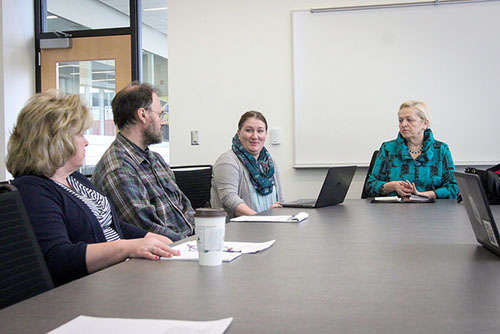
This talk was held as part of Winona State’s 2015-2016 university theme “Equity as a Human Right.” (Photo by Sarah Murray)
Elizabeth Pulanco / Winonan
Every year, Winona State University focuses on a theme and addresses different needs within the topic. This year’s theme is “Equity as a Human Right.”
History professor Colette Hyman and a group of her colleagues have sponsored several meetings, called “teach-ins,” where staff members are educated about issues involving equity and begin brainstorming ideas on how to solve them.
Hyman also mentioned that Winona State President Scott Olson and Provost Patricia Rogers have been actively involved with the conversations and have provided their own ideas and views.
“During all of our brainstorming, we separated into different work groups and one of them was to look at issues around food,” Hyman said. “One of our colleagues there was aware that food was a concern, particularly for international students, for whom it is not always easy for them to find the foods for their needs.”
The Food Equity Committee has been preparing a proposal to become an all-university committee, which would provide them with more support from administration and a larger group of people to work with.
The group focuses on issues related to food equality on campus, with an emphasis on covering the dietary needs and cultural food needs of students in a sustainable way.
Sue Groth, Campus Card manager, has been one of the leading forces behind the group and invited speakers to one of the recent meetings.
One of the speakers was student Alison Bettin. Bettin, an ecology and public administration student, has a passion for food and has many goals for creating a more sustainable university.
Before attending Winona State, Bettin earned a culinary arts degree in 2003 and spent many years working in the food industry.
“I spent many years working in private clubs and restaurants, and I saw a lot of food waste. And then I saw a lot of people who didn’t have any food,” Bettin said.
After leaving the food industry, Bettin decided to dedicate her time to creating sustainable methods for food.
At the meeting, she suggested the creation of a cultural sustainability center, which would include a learning kitchen and a garden. She would also like to teach students how to plant their own food and establish how food is grown.
“We can educate people about engineering, philosophy and English, but if someone doesn’t know where their food comes from, how to grow food or how to feed themselves healthy food, then what is an education for?” Betting said. “With the introduction of convenience food, cooking has become a mystery. When I tell people I have a degree in culinary arts, they look at me like I’m a magician.”
Biology professor Bruno Borsari mentioned how he used to cook meals with students and colleagues at a kitchen in Maria Hall on Winona State’s west campus around six or seven years ago, but the space is not currently being used.
Director of Student and Community Engagement Kendra Weber was also at the meeting and discussed ideas about how to help students who are food insecure.
Weber mentioned if a facility like Bettin’s cultural sustainability center is created, then food delivery to students would have to be discrete, because there is a stigma around food insecurity.
Weber also mentioned building a food shelf on campus that would provide food insecure students with the food and cooking utensils they need.
Nadine Bayer from Winona Volunteer Services was also invited to the meeting. Bayer works with the food shelf and the food delivery program and discussed how the food shelf teaches people to shop for certain meals.
Groth discussed how she has been approached by students and professors about their own issues with food insecurity and said some professors provide students in need with gift cards to places like Subway for food.
With the proposal of the creation of an all-university committee focused on food equity, the group hopes to help out students in need.
“It is difficult to think that there are students here who don’t know where their next meal is coming from,” Bettin said. “We’ve got to find these connections to our past, our cultures and each other. We need to think of making food as a way to connect with others and not a chore.”










































